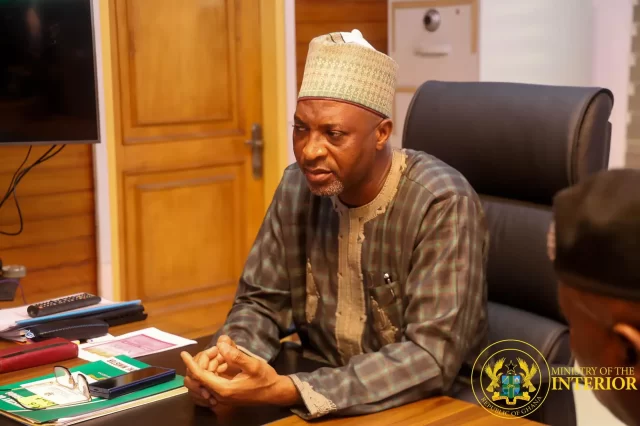The Minister for the Interior, Muntaka Mohammed-Mubarak, has called for strengthened anti-money laundering laws in Ghana.
He has also urged the Inter-Governmental Action Group against Money Laundering in West Africa (GIABA) and the Financial Intelligence Centre (FIC) to collaborate in this effort.
During a meeting with a GIABA delegation led by Director-General Edwin Harris, Hon. Muntaka emphasised the government’s commitment to supporting GIABA’S work in maintaining a safe and secure environment.
The Director-General of GIABA, Mr. Edwin Harris acknowledged Ghana’s active participation in GIABA operations and encouraged continued collaboration.
Mr. Harris stated that Ghana has made significant progress in strengthening its anti-money laundering laws, with the passage of the Anti-Money Laundering Act 2020 (Act 1044).
READ ALSO: Terrorist Financing: Lavish lifestyle of Forex Bureau workers is a red flag – BoG report
The meeting had in attendance the Deputy Minister for the Interior, Hon. Okletey Teilarbi, the Acting Chief Director of the Ministry, Mrs. Doreen Annan, the Acting Chief Executive Officer of FIC, Albert Kwadwo Twum Boafo and other officials from the Ministry, GIABA and FIC.
Recently, a report by the Bank of Ghana titled ‘Anti-Money Laundering/Combating the Financing of Terrorism & the Proliferation of Weapons of Mass Destruction (AML/CFT&P) guidelines, for Foreign Exchange Bureaux’ said that money Laundering, Terrorism Financing, and Proliferation Financing Risk Assessments (ML/TF&PF) are global phenomena that have gained recognition in recent times.
The report said that indeed well-documented evidence indicates that ML/TF&PF pose major threats to international peace and security which could seriously undermine Ghana’s development and financial stability.
Consequently, it said, Ghana has made concerted efforts to address ML/TF&PF risks.
The enactment of the Anti-Money Laundering Act, 2008 (Act 749); Anti-Money Laundering (Amendment) Act, 2014 (Act 874); Anti-Terrorism Act, 2008 (Act 762); Anti-Terrorism (Amendment Act), 2012 (Act 842); Anti-Terrorism (Amendment Act), 2014 (Act 875); Anti-Money Laundering
Regulations, 2011 (L.I.1987) and the subsequent passage of the Anti-Money Laundering Act, 2020 (Act 1044) has intensified Ghana’s efforts towards the fight against Money Laundering, Terrorism Financing and Proliferation Financing (ML/TF&PF).
The report however noted that Foreign Exchange Bureaux, in particular, have come under sustained regulatory scrutiny to improve their monitoring and surveillance systems with a view to detecting, preventing, and mitigating ML/TF&PF risks.
To that end, a guideline has been introduced to monitor the operations of the Forex Bureaux.
The guideline covers among others the following key areas of any AML/CFT&P programme:
- Anti-Money Laundering Reporting Officer designation and responsibilities;
- Co-operation with the Supervisory Authority;
iii. Customer Due Diligence;
- Risk assessment;
- Monitoring and reporting of suspicious transactions;
- Regulatory reporting requirements;
vii. Recordkeeping; and
viii. AML/CFT&P employee training programmes.
Foreign Exchange Bureaux are exposed to varying ML/TF&PF risks through unlawful activities with serious financial and reputational damages if they fail to manage these risks adequately.
Diligent implementation of the provisions of these Guidelines will not only minimise the risks faced by Foreign Exchange Bureaux of being used to launder the proceeds of crime but also provide protection against economic and organised crime, reputational and financial risks.
In this regard, Foreign Exchange Bureaux are required to adopt a risk-based approach in the identification and management of ML/TF&PF risks. Foreign Exchange Bureaux shall ensure that AML/CFT&P policies governing their operations do not only prescribe money laundering and predicate offences but also prescribe sanctions for non-compliance with the relevant AML/CFT&P requirements.
“It is, therefore, in the best interest of the Foreign Exchange Bureaux to entrench a culture of compliance which would be facilitated by these Guidelines,” the report said.















